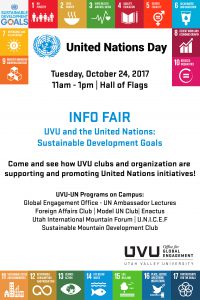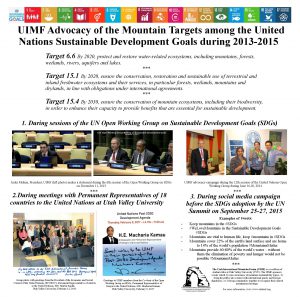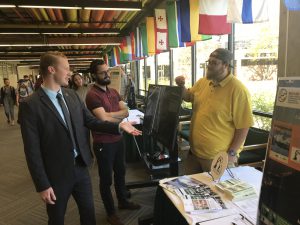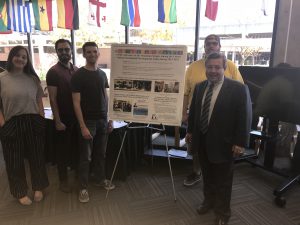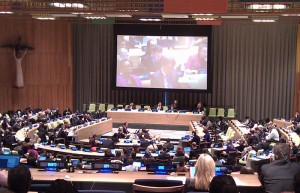 On December 4th, 2017, Utah International Mountain Forum (UIMF), a coalition of student clubs at Utah Valley University (UVU) were able to again host International Mountain Day (IMD) at UVU campus. First established by the United Nations in 2003, this will be the seventh IMD celebration held by UIMF at UVU. IMD is usually celebrated on December 11th, however students decided it best to hold the event a week prior to the designated date so that students would not have conflicts with their final examination schedules.
On December 4th, 2017, Utah International Mountain Forum (UIMF), a coalition of student clubs at Utah Valley University (UVU) were able to again host International Mountain Day (IMD) at UVU campus. First established by the United Nations in 2003, this will be the seventh IMD celebration held by UIMF at UVU. IMD is usually celebrated on December 11th, however students decided it best to hold the event a week prior to the designated date so that students would not have conflicts with their final examination schedules.
 Dr. Baldomero Lago addressing audience members at Utah Valley University
Dr. Baldomero Lago addressing audience members at Utah Valley University
Students, members of UIMF hosted the event as a tradition through student engaged learning initiative, when students are provided an opportunity to gain professional experiences and skills while working on all details of the event by themselves as a team with faculty giving up them power and serving as mentors only. Students were pleased to assign responsibilities through task list posted online: some of them invited academics, community members, and student speakers to give presentations during the event. others handled protocol or logistics or media coverage, and many other important aspects of hosting such high-level event like IMD. This year’s celebration included the following agenda featuring many prominent presenters;
- Keynote Speaker: Dr. Baldomero Lago, CIO/Vice-Rector of the Office of Global Engagement at Utah Valley University
- Letters of greeting from Governor of Utah Gary Herbert, Mayor of Orem Utah Richard Brunst, and Dr. Ross “Rusty” Butler of the Russian Academy of Natural Sciences
- Chelsey Butchereit, a refugee advocate and professor at Brigham Young University
- Gina Cornia, the executive director of Utahns Against Hunger
- Colleen Bye, a representative of the lobbyist group Citizens Climate Lobby chapter in Salt Lake City, Utah
- Derek Garfield, a student at UVU
- Megan Raines, a student at UVU
- Baktybek Abdrisaev, a former Ambassador of the Kyrgyz Republic to the United States and Canada from 1997-2005; a current professor and focal point for the United Nations Mountain Partnership at UVU
 Mayor Brunst of the City of Orem greets audience on occasion of the IMD 2017
Mayor Brunst of the City of Orem greets audience on occasion of the IMD 2017
Speakers addressed topics from the 2017 IMD theme: “Mountains Under Pressure: climate, hunger, migration.” Students worked hard to find speakers who could adequately address each theme for IMD both for Utah, nationally, and internationally. Many from the audience commented that the list of speakers was very diverse and allowed each topic in the 2017 theme to be covered.
Dr. Baldomero Lago, the CIO and Vice Rector for the office of Global Engagement at Utah Valley University was identified as a keynote speaker. IMD celebration as prominent gathering featuring the United Nations mountain agenda during already seven years provided him a unique opportunity to make major announcement that UVU joined a partnership program with the United Nations Department of Public Information (UN/DPI). When Dr. Lago colleagues applied for such status to the UN DPI, they made references on many initiatives and achievements of UIMF in promotion of mountain agenda during last 10 years. As Dr. Lago emphasized in his speech, UVU hopes to continue to be a leading player in sustainable mountain initiatives and is honored to be afforded such a prestigious opportunity.
Honoring student’s efforts in hosting IMD 2017 and as a response to their invitation to IMD 2017, Governor of Utah, Gary Herbert, sent a letter of well wishes to those who set up the event, and also about his beliefs in the importance of Sustainable Mountain Development (SMD) goals. Mayor of the City of Orem Richard Brunst, supports IMD celebrations since 2011, when Orem joined the United Nations Mountain Partnership and he warmly greeted the audience as well. Similarly, Dr. Ross Butler, the main representative of the Russian Academy of Natural Sciences, and NGO registered under the United Nations spoke and highly evaluated his experiences of working with UIMF both in IMD celebrations and in general in advocacy of the SMD agenda.
Ms. Chelsey Butcherit, refugee advocate and adjunct faculty at Brigham Young University, spoke on the importance of helping refugees in Utah. She spoke of the need to see the humanity in all humans no matter how far away or how different their culture may be, that we ought to help them and Utah is the perfect place where such an ideal could be sustained.
Ms. Gina Cornia, the executive Director of Utahns Against Hunger spoke on the vast poverty divide that is so ever present even in modern-day developed societies (such as Utah). She urged audience members to understand that many people in Utah Valley struggle to feed themselves and/or their families. Furthermore, that we ought not to look down upon these underprivileged people, rather we ought to empower them and provide them with more resources and different opportunities within their respective communities.
Ms. Colleen Bye, a resident faculty member at UVU, who also actively involved and represent prominent NGO Climate Change Lobby spoke passionately about climate change – a rather hot topic in Utah today. She showed audience members factual evidence of the harm modern day people are doing to planet Earth and the ramifications of what could happen if our current (negative) trajectory. Furthermore, she also gave audience members ways in which they are able to positively impact their environment by becoming active in local organizations and movements working in climate change.
Our two student speakers Mr. Derek Garfield and Ms. Megan Raines took the time to address specific cases they have been tirelessly studying. Mr. Garfield educated audience members on climate change impact on Sami indigenous groups in Sweden and Ms. Raines was able to show what a bit of money and compassion can do to provide help to children and families in Uganda. Both undergraduate students showed extreme passion and promise, and myself and other audience members included were moved by their research and passion in their respective areas of study.
During the event students were able to engage with speakers about the 2017 theme and learn the ways in which they would be able to engage with sustainable mountain development in the future. However, they were able to invite not only students in the audience. Community members from Utah Valley and faculty and staff from UVU were also able to attend the event to learn the ways they can influence their community, workplaces, and better ways in which they can teach their students to progress the agendas of mountain sustainability. One audience member stated “I was not aware of the problems mountainous communities were facing before today. I am happy that I chose to attend because I have been inspired to learn more about my own mountainous community, and understand how to help internationally!”.
 Aaron Holloway, UIMF member with certificate of contribution from FAO-UN
Aaron Holloway, UIMF member with certificate of contribution from FAO-UN
After the event concluded many stayed around to have further conversations with speakers, and to engage with each other. During this time Dr. Baktybek Abdrisaev, UVU faculty and a focal point for the United Nations Mountain Partnership with the help of Matthew Rands UIMF President and Danny Davis, UIMF Vice-President presented certificates to all those throughout 2017 that helped to advance the sustainable mountain goals. It was incredible to see the huge amount of people that actively helped in the process. It also helped students to see and understand the importance of working together with one’s community and the help that can be found as long as one asks for it. In all, the event was a huge collaborative effort from students and the community and the UIMF leadership was so pleased with the outcome of the event.
 Pictured: Audience members during IMD 2017.
Pictured: Audience members during IMD 2017.
UIMF is beyond pleased with all the student’s effort in making IMD a reality for this seventh annual celebration and hopes to continue to implement practices from the UN’s 2015 agenda, and work towards the 2030 agenda.
Lacee Meyer, Vice-President, UIMF
***
***
***
***
***
***
Greetings From Governor Herbert
***
Letter of Greetings From Mayor Brunst, Orem City
***
Greetings From Russian Academy of Natural Sciences, MP member
***
***
UIMF MEMBERS REFLECTIONS
Lacee Meyer: Seventh Annual International Mountain Day Celebration at UVU
***
***
Dylan Genes: Hosting the International Mountain Day at UVU
***
Ruben Garces: Utah Valley University becomes a member of the United Nations DPI
***
STUDENT REFLECTIVE ESSAYS
***
Mark Wait: International Mountain Day at UVU
***
Kristine Beardall: UVU’s seventh annual International Mountain Day: a student’s perspective
***
Pamela Miller: International Mountain Day 2017
***
Kimberlee Anderson: International Mountain Day Commemoration
***
Logan Perfili: International Mountain Day at UVU
***


